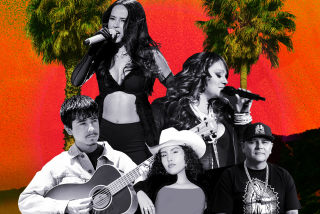Lalo Guerrero, 88; Pioneering Barrio Singer
Lalo Guerrero, the pioneering barrio troubadour whose bilingual repertoire spanned a vast variety of Mexican and American genres over seven decades and earned him worldwide accolades as the Father of Chicano Music, died Thursday. He was 88.
Guerrero, who was suffering from prostate cancer, increasing frailty and memory loss, died at a nursing home in Palm Springs, near his longtime residence. The exact cause of death was not immediately known, relatives said.
The son of blue-collar Mexican immigrants, Guerrero was a self-styled folk musician who made up for his lack of formal training with a witty knack for capturing the everyday joys, sorrows and absurdities of Mexican American life, largely ignored by mainstream pop music. His songs were so emblematic of the bicultural experience during World War II that they were prominently featured in 1977’s “Zoot Suit,” the groundbreaking stage and film musical that dramatized, to Guerrero’s swing-time beat, the persecution and survival spirit of the so-called pachucos.
“The play would not have been possible without his music,” said writer and director Luis Valdez, Guerrero’s nephew. “So many focus on the negative side, but what Lalo captured was the joy of the pachuco experience, the playful vacilon [good times], which no one else had done. That was something that was always unfailing with his work -- his great sense of humor and love for life.”
Eduardo “Lalo” Guerrero Jr. was born on Christmas Eve 1916 in the Barrio Viejo of Tucson, one of 24 siblings, only eight of whom survived to adulthood. His father worked on the railroads, and his mother taught him to sing and play guitar.
As a teenager, he wrote “Cancion Mexicana,” the first of hundreds of songs recorded on various labels since the 1930s. His trademark was his versatility. He was able to compose and sing in an array of styles, including traditional boleros and corridos, as well as upbeat mambos and boogie-woogies. He also wrote protest songs, such as “Battle Hymn of the Chicano” (1989), and comic parodies, such as “Mexican Mamas, Don’t Let Your Babies Grow Up to Be Bus Boys” (1990) and “No Chicanos on TV” (1986).
Perhaps his best-known composition is the 1955 hit “Pancho Lopez,” a parody of “Davy Crockett.” The singer used his royalties to open an East Los Angeles nightclub, Lalo’s, which became a popular venue for the best bands from Latin America for the next 15 years.
Like many other Chicanos, Guerrero felt caught between cultural identities. When he tried to perform in Mexico, he was rejected as a pocho, a disparaging term for an Americanized Mexican. But when he tried to cross over as Eddie Lopez in the U.S., he didn’t get much further, despite his love for artists such as Al Jolson and Rudy Vallee.
“He used to say that nobody was going to hire a 6-foot tall, Indian-looking Mexican to sing with Tommy Dorsey,” recalls his son, entertainment producer Dan Guerrero. “So he did the next best thing and took swing to Spanish.”
Guerrero turned the Chicano cultural conflict into a creative affirmation, embracing both identities through original music that mixed languages and styles. He converted the English-language concept of singing chipmunks, a 1950s novelty act, into his own popular series of children’s recordings under the name “Las Ardillitas de Lalo Guerrero,” or “Lalo’s Little Squirrels.”
In 1995, Los Lobos, the Chicano rock group that East L.A. spawned, invited Guerrero to join them on their bilingual children’s album, “Papa’s Dream,” which earned a Grammy nomination.
Guerrero kept working, and receiving prestigious honors, almost to the end. In 1997, he became the first Chicano to receive the National Medal of Arts, awarded by President Clinton. And in 1998, Guerrero performed for the first time in Europe, at Paris’ Cite de la Musique.
Despite the international kudos, Guerrero’s heart remained in the barrio. He was in his 70s when he wrote “Barrio Viejo,” a song lamenting the displacement of residents from his beloved Tucson neighborhood to make way for a convention center. His expression of loss and powerlessness in the face of societal forces proved such a universal barrio theme that musician Ry Cooder picked it for an upcoming album about the history of Chavez Ravine, the Los Angeles neighborhood torn down to build Dodger Stadium.
A television documentary about the late singer is being co-produced by his son Dan and filmmaker Nancy De Los Santos. Based on extensive interviews recorded six years ago, the project is titled “Lalo Guerrero: The Original Chicano.”
“Lalo lived his life the way he wanted to live it -- through music,” said De Los Santos. “And at the same time, he was able to bring our story, the story of Mexican Americans, to life.”
Though exact dates have not been set, funeral plans include a memorial Mass in Palm Springs next week, followed by a Mass and burial in Tucson. The family announced plans to organize a future memorial concert in Los Angeles to celebrate Guerrero’s life and achievements.
The musician is survived by his two sons, Dan and Mark, from his first marriage to Margaret Marmion of Tucson. He is also survived by his wife, Lidia Guerrero, and her two children, whom he adopted, Patricia Lowey and Jose Guerrero; his sisters Teresa Mallic, Mona Wood and Connie Abbot, all of Tucson; his brothers, Gene Guerrero of Moreno Valley and Ruben Guerrero of Phoenix; as well as by his granddaughter, Maya Guerrero.
More to Read
The biggest entertainment stories
Get our big stories about Hollywood, film, television, music, arts, culture and more right in your inbox as soon as they publish.
You may occasionally receive promotional content from the Los Angeles Times.










